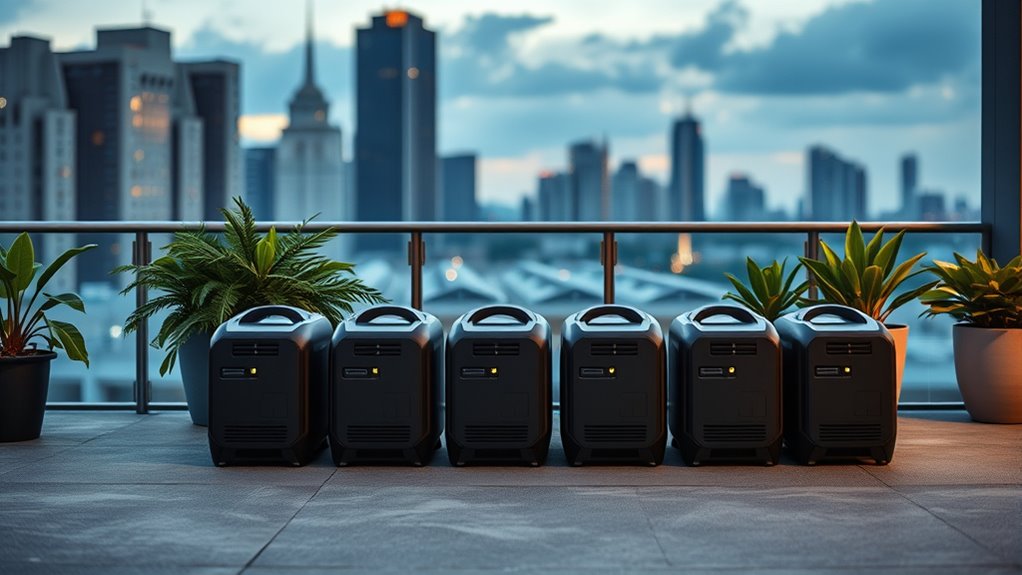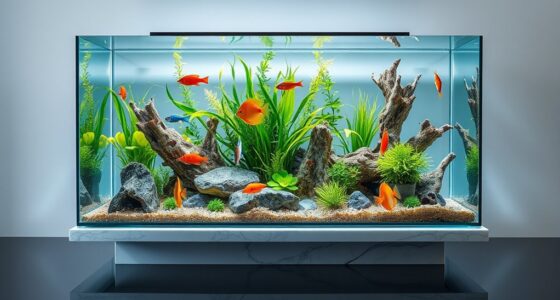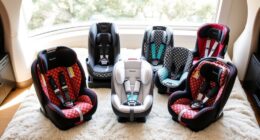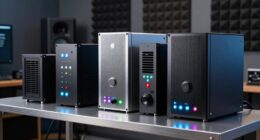If you’re looking for quiet, reliable power for your apartment in 2025, I recommend considering models like the ERAYAK 2400W inverter, WEN 56360i, WEN dual-fuel 6800W, a 4400-watt inverter, or the Westinghouse Tri-Fuel generator. These options balance low noise levels, portability, fuel efficiency, and safety, making them perfect for sensitive spaces. Want to find out which model suits your needs best? Keep exploring to discover more.
Key Takeaways
- Look for inverter generators with noise levels below 55 dB for quiet apartment use.
- Prioritize models with low THD (0.2%-1.2%) to ensure safe power for sensitive electronics.
- Choose lightweight, portable units with wheels and ergonomic handles for easy maneuvering.
- Select dual-fuel or fuel-efficient models with long runtimes to reduce refueling disruptions.
- Ensure the generator has safety features like low oil shutdown and CO detection for reliable operation.
ERAYAK 2400W Portable Inverter Generator for Home Use
If you’re looking for a quiet, reliable power source for your apartment, the ERAYAK 2400W Portable Inverter Generator is an excellent choice. It delivers 2400 peak watts and 1800 running watts, perfect for backup power or outdoor activities. Its advanced inverter technology provides clean, stable electricity with low THD, making it safe for sensitive electronics like laptops and medical devices. Operating at just 52.5 dB, it’s incredibly quiet—ideal for residential settings. Plus, it’s lightweight at 42 pounds and compact, with features like multiple outlets and eco mode that guarantees efficient fuel use, giving you up to 16 hours of reliable power.
Best For: individuals seeking a quiet, portable, and reliable power source for home backup, camping, RV trips, or outdoor activities.
Pros:
- Ultra-quiet operation at just 52.5 dB, ideal for residential and campground settings
- Clean, stable power with low THD safe for sensitive electronics like laptops and medical devices
- Lightweight and compact design (42 lbs) with optional wheel kit and telescoping handle for easy transport
Cons:
- Limited continuous running time if used at full load due to fuel consumption constraints
- May require additional accessories (like wheel kit) for enhanced portability, which are sold separately
- Not suitable for heavy-duty industrial use or high-power appliances beyond 2400W peak capacity
WEN Portable Inverter Generator (56360i)
The WEN Portable Inverter Generator (56360i) stands out as an ideal choice for apartment dwellers who need a quiet, reliable power source without disturbing neighbors. Its 149cc engine delivers up to 3600 surge watts and 2900 rated watts, providing clean power perfect for sensitive electronics like phones and laptops. Weighing just 46 pounds, it’s lightweight and easy to carry. The generator features multiple outlets, including USB ports and an RV-ready socket, making it versatile for various needs. Its fuel shutoff maximizes efficiency, and with a three-year warranty, it’s built for durability. Quiet operation and portability make it a smart, dependable option for apartment living.
Best For: apartment dwellers and outdoor enthusiasts seeking a quiet, portable, and reliable power source for sensitive electronics and outdoor activities.
Pros:
- Lightweight at only 46 pounds, easy to transport and store
- Produces clean, stable power suitable for sensitive electronics like phones and laptops
- Multiple outlets including USB ports and RV-ready socket for versatile use
Cons:
- Limited to 2900 rated watts, which may not power larger appliances simultaneously
- As a small generator, it may not be suitable for heavy-duty or high-power needs
- The fuel capacity might require frequent refueling during extended use
WEN Quiet 6800-Watt Dual Fuel Portable Inverter Generator
For apartment dwellers seeking reliable backup power without disturbing the neighbors, the WEN Quiet 6800-Watt Dual Fuel Portable Inverter Generator stands out with its exceptionally quiet operation and versatile fuel options. It features a 224cc dual-fuel engine that runs on gasoline or propane, providing up to 6800 surge watts on gas and 6000 on propane. Safety is a priority, with CO shutdown sensors and fuel shutoff to extend its lifespan. Its compact design includes onboard wheels and a telescoping handle for portability, and it offers multiple outlets, including USB ports and RV-ready connections. This generator is a reliable, quiet solution for apartment emergencies and outdoor needs.
Best For: apartment dwellers and outdoor enthusiasts seeking a quiet, versatile, and reliable backup power source with dual-fuel options.
Pros:
- Exceptionally quiet operation, ideal for noise-sensitive environments like apartments
- Dual-fuel capability (gasoline and propane) offers versatile fuel options and convenience
- Multiple outlets including USB ports and RV-ready connections for various devices
Cons:
- Slightly heavier and bulkier due to onboard wheels and portable design
- Higher price point compared to smaller, single-fuel generators
- Limited runtime on a single tank, requiring refueling for extended use
4400-Watt Portable Inverter Generator
A 0-watt portable inverter generator isn’t just about zero power output—it’s about providing a quiet, reliable source of energy for apartment living. This generator offers 4400 watts of peak power, with a steady 3600 watts rated, enough for essential appliances or small devices. It’s designed to operate at just 76 dB from 23 feet, making it ideal for residential areas and camping without disturbing neighbors. Weighing around 61 pounds and compact in size, it’s easy to move and store. Plus, safety features like low oil shutdown and carbon monoxide detection ensure peace of mind during extended use, whether for emergencies or outdoor adventures.
Best For: homeowners, campers, and outdoor enthusiasts seeking a quiet, reliable portable power source for emergencies, outdoor activities, or residential use.
Pros:
- Provides a strong peak power of 4400 watts with a steady 3600 watts rated, suitable for essential appliances and devices
- Operates quietly at 76 dB from 23 feet, ideal for residential areas and camping without causing disturbance
- Lightweight (61.29 lbs) and compact, making it easy to transport and store for various on-the-go needs
Cons:
- Limited fuel tank capacity of 1.6 gallons may require frequent refueling during extended use
- May be relatively heavy for some users to carry over long distances despite its portability
- As a gas-powered generator, it requires regular maintenance and refueling, which might not be ideal for all users
Westinghouse Tri-Fuel Portable Generator
If you’re living in an apartment and need reliable backup power without disturbing neighbors, the Westinghouse Tri-Fuel Portable Generator stands out with its quiet operation and versatile fuel options. It offers peak watts up to 13,500 on gasoline, with lower but sufficient power on propane and natural gas. Its 9.5-gallon tank provides up to 19 hours of runtime. The heavy-duty 500cc engine includes safety features like low oil and CO shutdowns. Remote electric start makes it easy to operate, and its multiple outlets are protected with rubber covers. Backed by a 3-year warranty, this generator combines power, safety, and convenience for apartment use.
Best For: apartment dwellers seeking reliable, quiet backup power with versatile fuel options and safety features.
Pros:
- Multiple fuel options (gasoline, propane, natural gas) for flexibility and convenience
- Quiet operation ideal for apartment environments and noise-sensitive areas
- Remote electric start with key fob for easy, hassle-free operation
Cons:
- Heavier and less portable due to large fuel tank and extensive features
- Higher upfront cost compared to smaller or single-fuel generators
- Limited runtime on natural gas and propane compared to gasoline under heavy load
Factors to Consider When Choosing a Quiet Portable Generator for Apartment Use
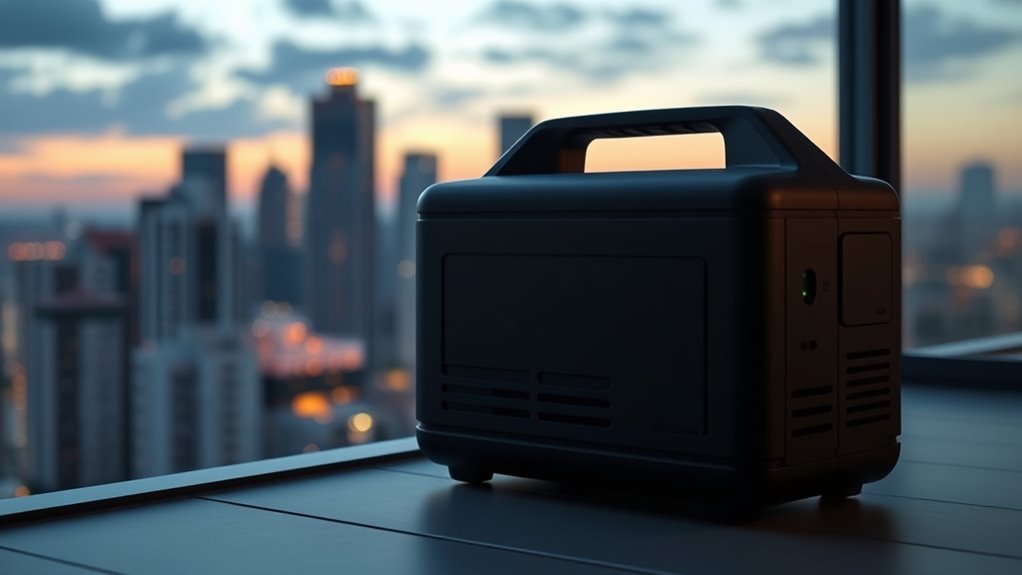
When choosing a quiet portable generator for my apartment, I focus on several key factors. I check the noise level limits, power capacity, and portability features to match my needs. I also consider fuel efficiency and whether it’s safe for sensitive electronics, ensuring I pick the right model.
Noise Level Limits
Choosing a quiet portable generator for an apartment means paying close attention to noise level limits to prevent disturbing neighbors. Typically, these limits fall between 50 and 60 decibels, which helps guarantee the generator isn’t disruptive. The EPA recommends that portable generators in residential areas produce no more than 60 dB at 7 meters. Ultra-quiet models often operate below 55 dB, roughly the volume of normal conversation, making them ideal for apartment living. To determine if a generator meets these standards, it’s important to check noise levels measured at standard distances like 25 or 7 meters. Additionally, local noise ordinances may specify maximum allowable levels, so always verify these restrictions before making a purchase. Staying within these limits ensures you keep peace with your neighbors.
Power Capacity Needs
To guarantee your portable generator can reliably power your apartment essentials, it’s essential to accurately assess your total wattage needs. Start by listing all devices you plan to run simultaneously, noting their starting (surge) and running watts. Appliances like refrigerators or air conditioners require higher surge watts at startup, so selecting a generator that can handle these peaks is critical. For sensitive electronics such as laptops or medical devices, pick a generator with low Total Harmonic Distortion (THD) to prevent damage. It’s wise to choose a unit with capacity slightly above your current needs to accommodate future devices or additional power demands. Portable inverter generators typically range from 1000W to 4000W, with higher wattage models offering more flexibility for multiple appliances without sacrificing quiet operation.
Portability Features
Selecting a portable generator that’s easy to move around your apartment starts with considering its weight and design. Look for models under 50 pounds, making them manageable to carry or shift. Built-in handles or wheels are essential features that help with quick transport and storage. Compact designs are a plus, fitting neatly into small closets or storage spaces without hassle. A telescoping or foldable handle adds to portability, allowing you to extend or stow it away easily. Ergonomic features such as grip-friendly handles and balanced weight distribution also make carrying more comfortable. By focusing on these portability features, you can ensure your generator is not only quiet but also simple to move when needed, fitting seamlessly into your apartment lifestyle.
Fuel Efficiency
Ever wondered how long your portable generator can run without frequent refueling? Fuel efficiency plays a big role here, directly impacting runtime and costs. Inverter generators with eco modes automatically adjust engine speed based on load, helping conserve fuel. At around 25% load, they typically consume between 0.21 and 0.2375 gallons per hour, meaning longer operation between refills. Choosing a generator with a low fuel burn rate means less hassle during extended outages or camping trips. Additionally, dual-fuel models offer more flexibility, allowing you to switch between gasoline and alternative fuels for better efficiency. By prioritizing fuel efficiency, you’ll enjoy longer, quieter use without constantly searching for fuel sources—making your apartment setup more reliable and cost-effective.
Sensitive Electronics Safety
When choosing a quiet portable generator for apartment use, safeguarding your sensitive electronics should be a top priority. I recommend selecting a generator with low Total Harmonic Distortion (THD) of 0.2%-1.2%, which guarantees stable, clean power for laptops, medical devices, and other delicate gadgets. Inverter generators are ideal because they produce smooth, noise-free output that prevents voltage fluctuations that could harm your electronics. It’s also vital to verify the generator’s rated power capacity matches your devices’ requirements to avoid overloading. Using surge protectors and power filters adds an extra layer of safety against unexpected power spikes. Regular maintenance and testing of the generator’s output further guarantee consistent, safe operation, giving you peace of mind when powering sensitive electronics in your apartment.
Size and Storage
Since apartment spaces can be limited, choosing a compact and lightweight generator is essential for easy storage and portability. I recommend models under 50 pounds, with foldable handles and built-in wheels to make transportation simple. Look for generators with a small footprint—ideally under 20 inches in length and width—to fit into tight storage areas. Slim or vertical profiles are also beneficial, allowing you to store the unit on closet shelves or beneath furniture without hassle. Keeping size in mind guarantees your generator won’t clutter your space or become a burden to move when needed. This way, you maintain a tidy environment while having reliable power on hand. Compact, lightweight, and easily storable—these are key factors for apartment-friendly generators.
Runtime Duration
Choosing a generator with sufficient runtime is essential to guarantee you have reliable power when you need it most. A longer runtime means fewer interruptions and less frequent refueling, especially during outages or outdoor activities. The fuel tank size directly influences how long your generator can operate at a given load, so larger tanks generally offer extended power without constant attention. Operating at lower loads also improves fuel efficiency and extends runtime, making it more cost-effective. Some generators feature fuel shutoff mechanisms that draw on remaining fuel in the carburetor, further extending operation before refueling. For apartment use, aim for a generator with at least 8 to 10 hours of runtime at 25% load, ensuring enough power for overnight or prolonged needs without inconvenience.
Budget Considerations
Balancing your budget with the features you need is key to selecting a quiet portable generator for apartment use. I recommend setting a realistic range based on wattage, noise level, and desired features to verify you get good value. Higher-capacity models with advanced inverter technology tend to be pricier but offer quieter operation and cleaner power, which can be worth the investment. Don’t forget to factor in additional costs like fuel, maintenance, and accessories when evaluating affordability. While budget-friendly options might have limited runtime or fewer outlets, prioritize features that match your specific backup needs. Sometimes, spending a bit more upfront on a generator with better noise reduction and energy efficiency can save you money and hassle in the long run.
Frequently Asked Questions
How Long Do Quiet Portable Generators Typically Last on a Full Tank?
Quiet portable generators usually last between 8 to 12 hours on a full tank, depending on their size and power output. I’ve found that smaller models tend to run longer on less fuel, making them perfect for short outages or camping trips. Keep in mind, running at higher loads will drain the tank faster. Always check the manufacturer’s specs for precise runtime estimates tailored to your needs.
Are There Any Noise Restrictions for Generators in Apartment Complexes?
Did you know that over 60% of apartment complexes have noise restrictions? Yes, most places limit generator noise to around 60 decibels. I always check these rules before running my generator, to stay respectful of my neighbors. Quiet portable generators typically produce about 50-60 decibels, so I choose models that meet these limits. It keeps everyone happy and guarantees I won’t face complaints or fines.
Can These Generators Power Essential Appliances Simultaneously?
Yes, these generators can power essential appliances simultaneously, but it depends on their wattage capacity. I always check the surge and running watts to verify my generator can handle devices like my fridge, phone charger, and small heater at the same time. I recommend choosing a model with enough power output and a bit of extra capacity to avoid overloads and keep everything running smoothly when you need it most.
What Maintenance Is Required to Keep a Generator Running Quietly?
Keeping your generator quiet is like tending a delicate garden — it requires regular care. I check and change the oil, clean the air filters, and inspect spark plugs every few months. Running the generator periodically prevents parts from seizing up, and keeping it dry and in a shaded spot helps minimize noise. Proper maintenance guarantees it hums smoothly and quietly, ready whenever you need it.
Are There Portable Generators With Built-In Battery Backup Options?
Yes, there are portable generators with built-in battery backup options. I’ve found models that combine traditional fuel-powered generators with integrated batteries, which can provide instant power without delay. These units are perfect for apartment use because they’re quiet, compact, and reliable. They’re especially handy during power outages or for small appliances, offering peace of mind knowing you’ve got a backup that’s ready to go whenever you need it.
Conclusion
Choosing the right quiet portable generator for my apartment was about more than just noise levels; it’s about peace of mind. Whether I went for inverter efficiency or fuel versatility, I knew I was making a smart move. Remember, it’s better to be safe than sorry, so pick a model that fits your needs and keeps the noise down. After all, a little quiet now can save a lot of headaches later.
